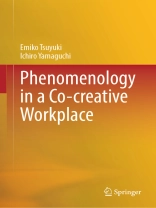This book introduces phenomenology to reveal how the atmosphere and relationships in the workplace are generated and how this affects creativity. In their daily work, people sometimes feel that ‘today’s meeting was more exciting than expected’ or that ‘everyone’s motivation is down”. This unspoken workplace atmosphere has a significant impact on their work. But has enough thought been given to how this workplace atmosphere is created?
Phenomenology reveals the basic structure of human relationships in the workplace. Are there any general rules that govern human interaction and the nature of relationships in that workplace? If these unspoken rules can be made explicit – clearly felt and spoken — people can work together to bring about a creative workplace in which individuals can maximize their abilities.
The main point of the book is that human relationships are based on a two-layered structure: ’emotional communication’, which is rooted in human sensitivity and centers on sensation and emotion; and ‘verbal communication’, which is based on shared intelligence and relies upon language and thought. The invisible layer of emotional communication is always at work as the foundation of verbal communication, creating what can be described as the ‘workplace atmosphere”. This book offers a new perspective on promoting creativity in the workplace by unraveling the principles behind the structure of workplace atmospheres.
Jadual kandungan
Preface.- Introduction.- Characteristics of Human Relationships in Japanese Society.- People Cannot Lie to Themselves.
Mengenai Pengarang
Emiko Tsuyuki Professor in Graduate School of Strategic Management, Chuo University. Since 2011 she has been a professor at Chuo Business school. She served as the Dean from 2019 to 2023. Professorial research fellow in Department of Philosophy in University of Wien, Austria(2018-2019).
Ph.d.in Knowledge Science(2003) supervised by Ikujiro Nonaka, an author of the Knowledge Creating Company. Her doctoral dissertation is entitled ‘Ba(place) and Knowledge Creation: A Phenomenological Approach to the Study of ‘Ba(Place)’ in Corporate Knowledge Creation Activities. She specialized in organizational theory, strategy, entrepreneurship and knowledge management.
Her research field is Ba(Place) and Co-Creation. She conducts multifaceted research projects on the nature of creative places in companies and other organizations. The distinctive feature of her research is the use of phenomenology to elucidate the principles of creative workplaces. The workplace atmosphere, a ‘ba(place)’ that is difficult to describe in words, is characterized by a dual-layered structure: a place of active intentionality where linguistic communication takes place and a place of passive
intentionality where affective communication takes place.
The field of active intentionality is a place that is recognized through intersubjectivity. On the other hand, the field of passive intentionality is a place perceived through intercorporality. The place mutually perceived by intercorporality always works behind the field of active intentionality, that is, intersubjectivity, and we perceive the field linguistically and non-verbally.
By viewing the Ba(place) as a dual structure, it becomes possible to view collective creativity as a function of intersubjectivity as well as intercorporality, and it becomes clear that the way each body of human is in the workplace has a significant impact on creativity. It is clear that vision, mission, and purpose are important in the workplace, but as long as they remain at the level of language, they do not lead to concrete action. It is only when vision, mission, and purpose are ‘understood(in sense and feeling)’ at the level of intercorporality, when vision, mission, and purpose as words are connected to the senses, that they move people in the workplace. Diversity in the workplace is important because having many bodies that feel leads to greater sensitivity in the workplace as a whole. Dialogue in the workplace is important because the exchange of words and sensations between people is essential in order to put unspoken sensations into words. This attempt to clarify the principle by applying phenomenology to creativity in the workplace is a major feature of her research and has significant implications for actual business management.
Ichiro Yamaguchi Professor Emeritus at Toyo University, Tokyo. Ph.D. in Philosophy in Department of Philosophy, University of Munich. Habilitation at the University of Bochum in Germany. He taught Philosophy and Japanese in Department of Economic Science at University of Witten-Herdecke in Germany (1990-94) and was Professor of Philosophy at Toyo University until 2013. His interests of the research of philosophy are in the field of Husserl’s phenomenology and the philosophy of Buddhism. He focuses on the theme of time and the Other, which is phenomenologically evident in the first part, Time and the second part Other in his book Genese der Zeit aus dem Du (2018). The theme of Other, phenomenologically, the question of the transcendental grounding of intersubjectivity has been criticised unresolved by subsequent phenomenologists, such as Heidegger, Scheler and Levinas. He rejects these criticisms as misrecognition of the concept of passive intentionality, which opens up the new field of research of ‘the phenomenology of the unconscious’ in Husserl’s genetic phenomenology. The passive intentionality of the intercorporarity makes affective, pre-linguistic communication possible, only through this can linguistically articulated communication be realised. His phenomenological oriented research of intercultural philosophy shows the possibility of refunding intercultural, social philosophy on the basis of Husserl’s genetic phenomenology.












